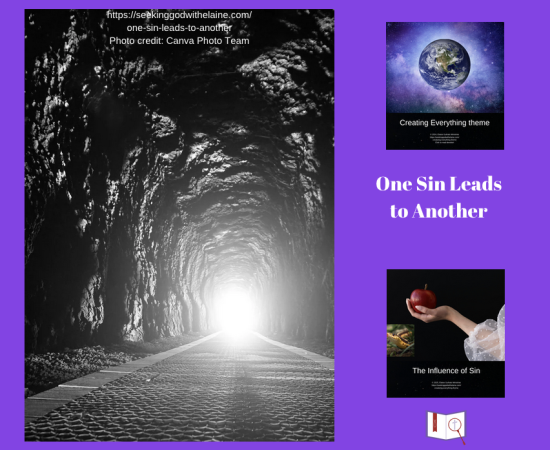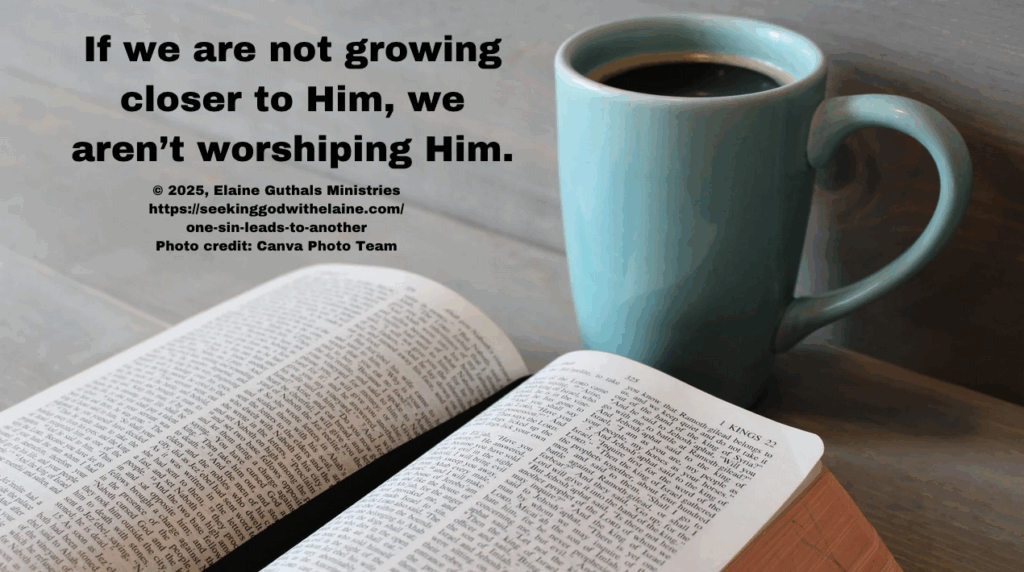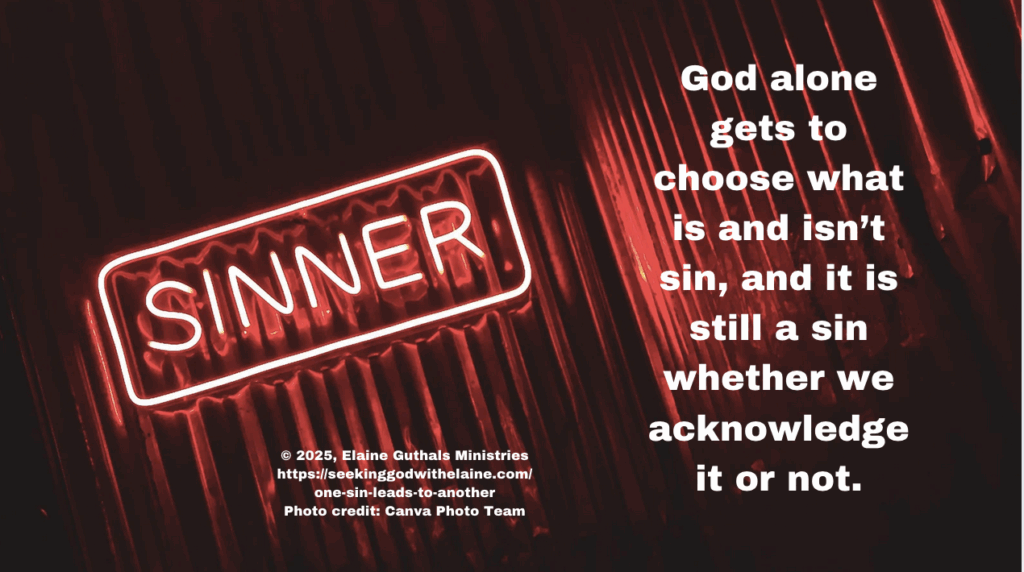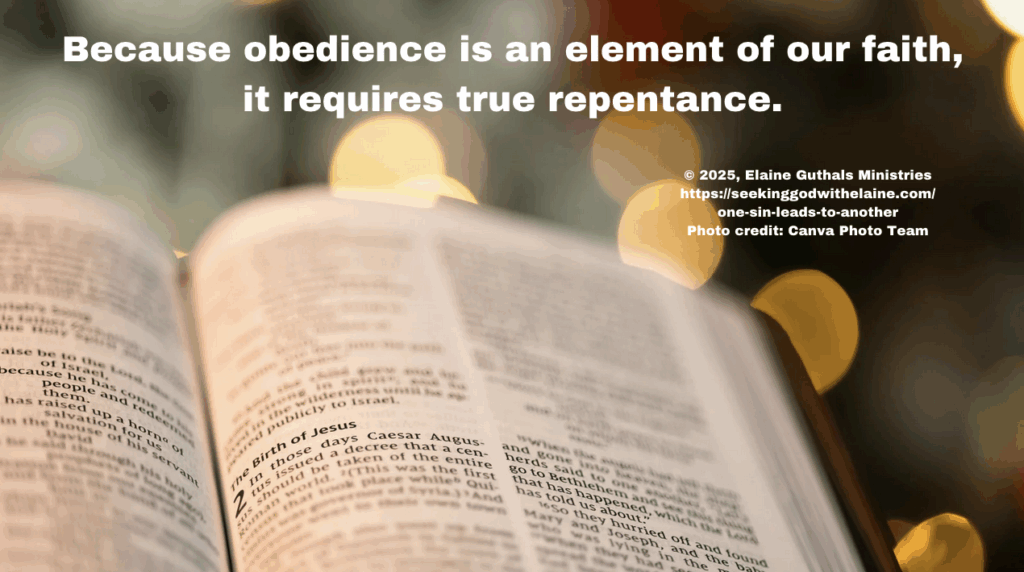Once we let sin into our lives, it snowballs from there. This devotional reading looks at how Cain’s sin evolved.
Nuggets
- Unchecked envy can lead to hatred and murder.

We’ve been talking about Cain’s anger felt because he and his sacrifice were not accepted by God. Unfortunately, it didn’t stop there.
Cain didn’t evaluate himself and his gift to see what he needed to change. Truth be known, he probably still didn’t believe he had done anything wrong.
Why do I say that? Cain was still fixated on Abel and the acceptance of his gift. He couldn’t move on.
Then things went from bad to worse. Sin led to other sins.
Let's Put It into Context
To read devotions in the Creating Everything theme, click the button below.
Devotions in the The Influence of Sin series
Committing Sin
“One day Cain suggested to his brother, ‘Let’s go out into the fields.’ And while they were in the field, Cain attacked his brother, Abel, and killed him” (Gen. 4: 8 NLT)
Unchecked envy can lead to hatred and murder.
If the original sin was a test of obedience and disobedience, we look at the second sin as human interaction. If truth be known, some think this sin — murder — is a bigger sin than the original sin.
In reality, the second sin was false worship.
Ooo, baby. How many of us think God should just accept our worship any way we do it? That is what the goats masquerading as sheep think. I remember when I was younger, that thought crossed my mind. Luckily, it didn’t stay long.
God has specific instructions as to how to worship Him. Bottom line is, if we are not growing closer to Him, we aren’t worshiping Him.

Cain couldn’t accept that. His disobedient heart became envious, angry, and hateful.
That led to murder.
I don’t think this translation is quite right. Cain didn’t lure Abel out into the fields to kill him.
“Kayin [Cain] had words with Hevel [Abel] his brother; then one time, when they were in the field, Kayin turned on Hevel his brother and killed him” (Gen. 4: 8 CJB).
Had words has nothing to do with suggesting something. To my way of thinking, Cain was still biting on Abel because Abel and his sacrifice were accepted, and Cain’s wasn’t.
Suggesting they go to the fields makes it sound like the attack and murder were premeditated. Having words could mean they were just talking.
The verse begins, “One day …” (Gen. 4: 8 NLT). It doesn’t say right then, the next day, or any indication of the time frame. We don’t know how long it took for Cain’s passion to bubble over.
Could Cain have planned the murder? Maybe. We just don’t have enough to make that determination.
Part of us hurt because of the animosity that Cain had for Abel. We don’t want to see harsh words between brothers.
I tend to believe the harsh words were only on Cain’s part. If Abel contributed his fair share, would the writer of Hebrews have had such a glowing character assessment? “… Although Abel is long dead, he still speaks to us by his example of faith” (Heb. 11: 4 NLT).
We aren’t told if Cain picked up a rock and bashed in Abel’s head. Maybe Cain didn’t use a weapon but just strangled him.
As usual, the how isn’t as important as the why.
Cain killed Abel because he threw a temper tantrum toward God.
Some would say that we have to go easy on Cain. Human death hadn’t occurred yet, so he may not have known whatever he did would end Abel’s life.
But Cain lost one thing that God is adamant that we need to be — self-control.
- “But the Holy Spirit produces this kind of fruit in our lives: love, joy, peace, patience, kindness, goodness, faithfulness, gentleness, and self-control. There is no law against these things!” (Gal. 5: 22-23 NLT).
- “… Supplement your faith with a generous provision of moral excellence, and moral excellence with knowledge, and knowledge with self-control, and self-control with patient endurance, and patient endurance with godliness” (II Pet. 1: 5-6 NLT).
- “Because of the privilege and authority God has given me, I give each of you this warning: Don’t think you are better than you really are. Be honest in your evaluation of yourselves, measuring yourselves by the faith God has given us” (Rom. 12: 3 NLT).
- “All athletes are disciplined in their training. They do it to win a prize that will fade away, but we do it for an eternal prize. So I run with purpose in every step. I am not just shadowboxing. I discipline my body like an athlete, training it to do what it should. Otherwise, I fear that after preaching to others I myself might be disqualified” (I Cor. 9: 25-27 NLT).
- “A person without self-control is like a city with broken-down walls” (Prov. 25: 28 NLT).
- “For God has not given us a spirit of fear and timidity, but of power, love, and self-discipline” (II Tim. 1: 7 NLT).
When we lose self-control, sin is mastering us.

Whether Cain lost it and attacked Abel or planned that outcome, he did not discipline himself to always follow God.
Gray argued that Abel’s death was probably unintentional. Maybe because we aren’t given cause of death.
Resource
Focus. The important issue is Cain was angry and envious and caused the death of Abel.
Yes, the brothers were as different as night and day. Yet, both chose their paths.
Making the Connections #1
Ooo, baby! Maclaren was correct. We don’t know how many millions of people have been killed on religious grounds.
Resource
All the way back to the Crusades — and further — to present day, people have been killed for their beliefs. Plus, that isn’t killed just because of their belief in Sovereign God.
Yep. Maclaren’s description of oceans of blood is probably very accurate.
We would characterize it as persecution for some, punishment for others.
Making the Connections #2
I have to process what Carey said. He wrote,
- “Cain’s sin appears to have been of a three-fold character, and consisted first in this: that, though he was a sinner both by nature and by practice, yet, as if unconscious that he was such, he made no acknowledgment of guilt.”
Resource
We assume Cain didn’t see Adam and Eve sin because the original sin happened in Genesis 3, and they were born in Genesis 4. But the could have been. They weren’t said to have been conceived in the image of Adam like Seth was (Gen. 5: 3).
Either way, Adam and Eve would have kept sinning, so they would have seen sin. Cain may even — probably — have sinned himself.
Cain did not do as Adam and Eve tried to do — deflect and excuse. Cain refused to acknowledge his actions as sin.
Yeah, read that again. Cain thought it should be okay that he killed his brother.
“God, therefore, instituted the ordinance of sacrifice, typical of that blood which should one day be shed upon the cross; and therefore it was only when a sacrifice had been first offered, by way of typical atonement, that then God could delight in the thanksgiving of the reconciled sinner. Now, Cain brought a thank offering only; clearly, then, he was practically unconscious of his guilty state before God.”
Resource
Just because we don’t acknowledge something as a sin — or don’t think it is — doesn’t mean it isn’t. God alone gets to choose what is and isn’t sin, and it is still a sin whether we acknowledge it or not.

So, we can’t say loving God is enough. Being a good person isn’t enough.
Cain tried that with the thanks offering. He had to admit and repent of his sins.
- “It is just in this way that thousands now, who, like Cain, are without faith, argue respecting God’s ordinances, especially respecting His great ordinance, Christ. Some will satisfy themselves with an ideal or speculative faith, who nevertheless have never really come to Christ, have never pleaded earnestly the merit of His sacrifice, or sought, as Abel did, the blood of sprinkling. Others altogether exclude from their religion faith in Christ as the only means by which they can be accepted of God; and this they do, not avowedly perhaps, but by a garbled sophistry.”
Resource
Ooo, baby. The scariest words in God’s Word is when the goats masquerading as sheep are going to find out they aren’t spending eternity where they think they are.
We can’t put God in a box and say, “This is how You are holy, and this is how we are going to worship You. We don’t care about right or wrong.”
Disobedience, Carey’s third character, is what got us in this mess in the first place. We have to get out of it the way He says will make us obedient.
Because obedience is an element of our faith, it requires true repentance. But then we know that Cain lacked true faith, Carey’s second character.

Still, God gave Cain the opportunity to repent – to increase his faith.
There is a link between sin and its punishment. God does not want the sin to happen. But when it does, He wants the punishment to show us what needs correcting in our lives.
One thing we may or may not recognize is part of Cain’s punishment was giving up his birthright. We’ve talked about how the firstborn frequently loses this privilege in Genesis. It happened here, too.
How Do We Apply This?
- Experience real joy when our brothers and sisters in Christ succeed.
- Don’t be envious of others.
- Don’t use words or looks as weapons.
- Give God our best worship because He will not accept false worships that do not have faith as their foundation.
- Don’t let our angry feelings get the best of us.
- Love everyone.
- Confess to God when we sin.
- Ask God for forgiveness when we sin.
Resource
Father God. We have a sinful nature since the original sin was committed. We know that we have all sinned and fallen short of Your standards. Increase our faith and obedience. Amen.
What do you think?
Leave me a comment below (about this or anything else) or head over to my Facebook group for some interactive discussion.
If you don’t understand something and would like further clarification, please contact me.
If you have not signed up for the email providing the link to the devotions and the newsletter, do so below.
If God has used this devotion to speak with you, consider sharing it on social media.